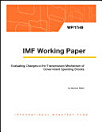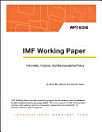The Welfare Implications of Services Liberalization in a Developing Country: Evidence from Tunisia
May 2013 · International Monetary Fund
Ebook
43
Pages
reportRatings and reviews aren’t verified Learn More
About this ebook
We propose an integrated method based on a two-sector small open economy dynamic and stochastic general equilibrium model to estimate non-tariff barriers and quantify the impact of services liberalization. The major component of trade barriers is explicitly modeled through the introduction of entry-sunk costs. Hence, liberalization is treated assuming a government's policy decision aimed at reducing those costs. Then, we estimate the model using Bayesian techniques for Tunisia and the Euro Area. The paper presents a precise quantitative evaluation of services trade barriers as the difference between entry-sunk costs in Tunisia versus the Euro Area. We find significant welfare benefits in addition to aggregate and sectoral growth gains the Tunisian economy could attain following services liberalization. Surprisingly, the goods sector is the one that benefits the most from services liberalization in the short- and long-term horizons.
Rate this ebook
Tell us what you think.
Reading information
Smartphones and tablets
Install the Google Play Books app for Android and iPad/iPhone. It syncs automatically with your account and allows you to read online or offline wherever you are.
Laptops and computers
You can listen to audiobooks purchased on Google Play using your computer's web browser.
eReaders and other devices
To read on e-ink devices like Kobo eReaders, you'll need to download a file and transfer it to your device. Follow the detailed Help Center instructions to transfer the files to supported eReaders.






